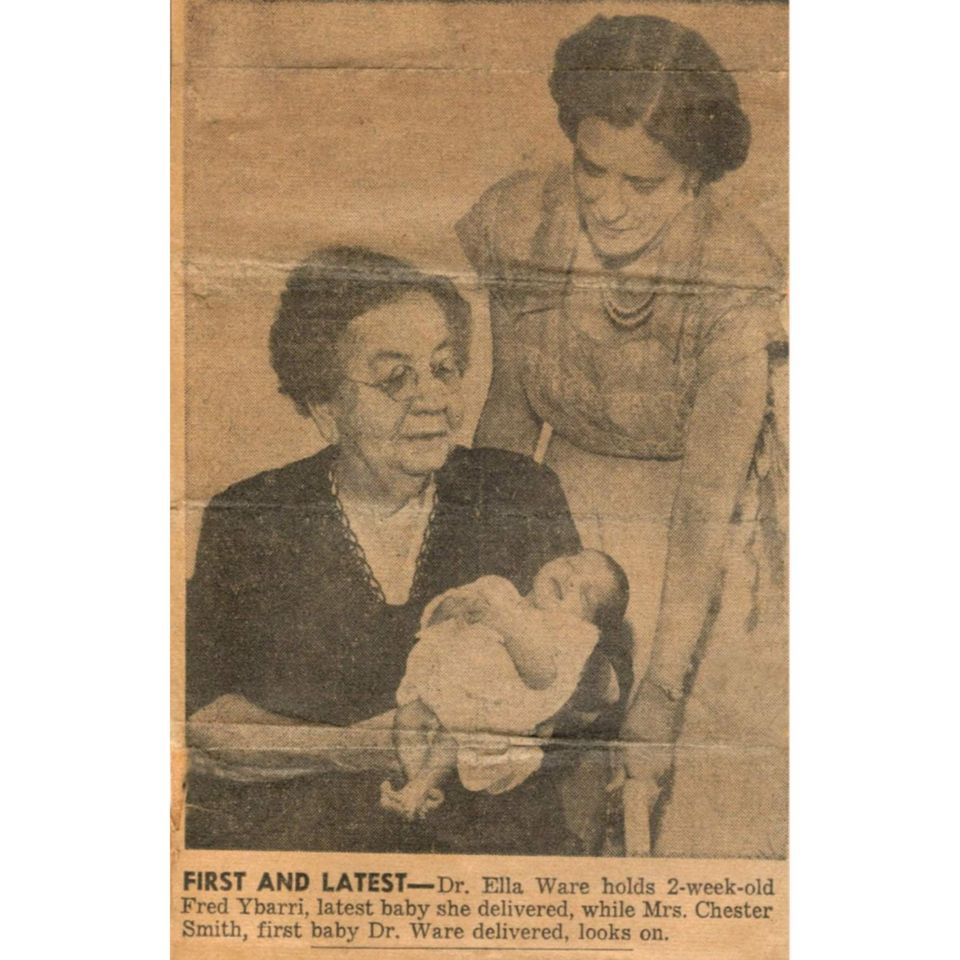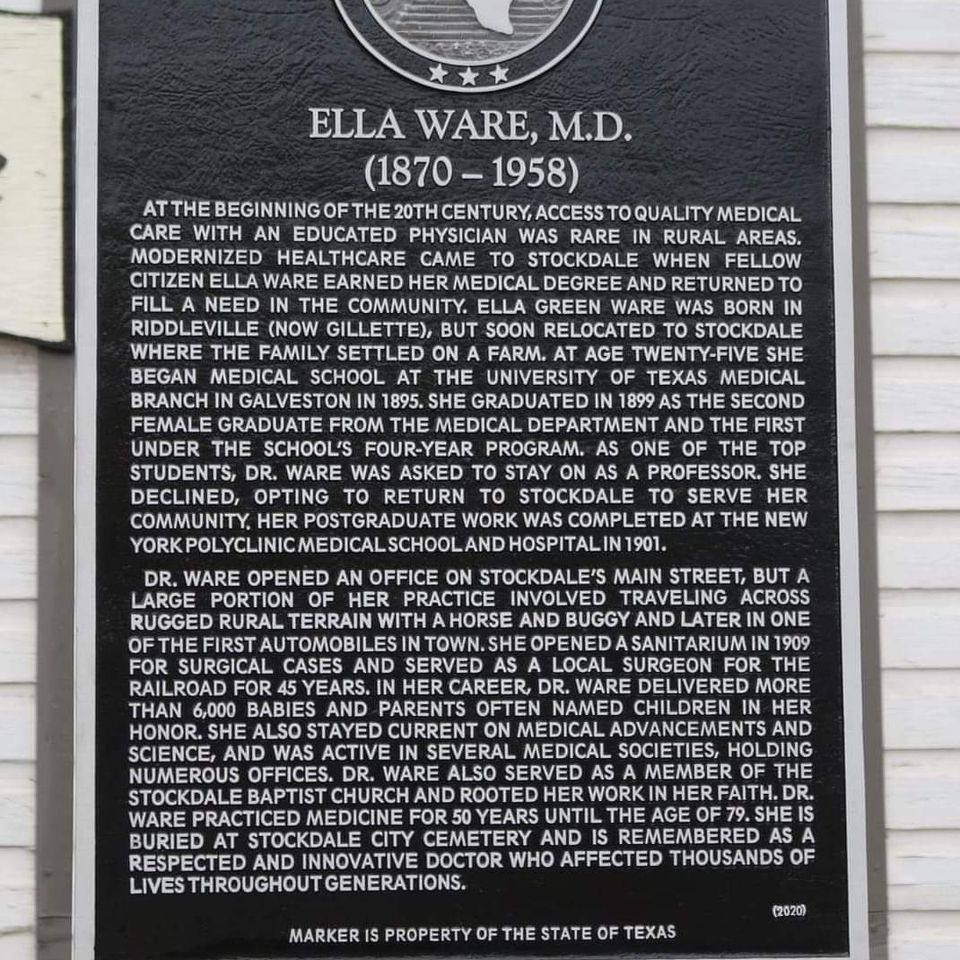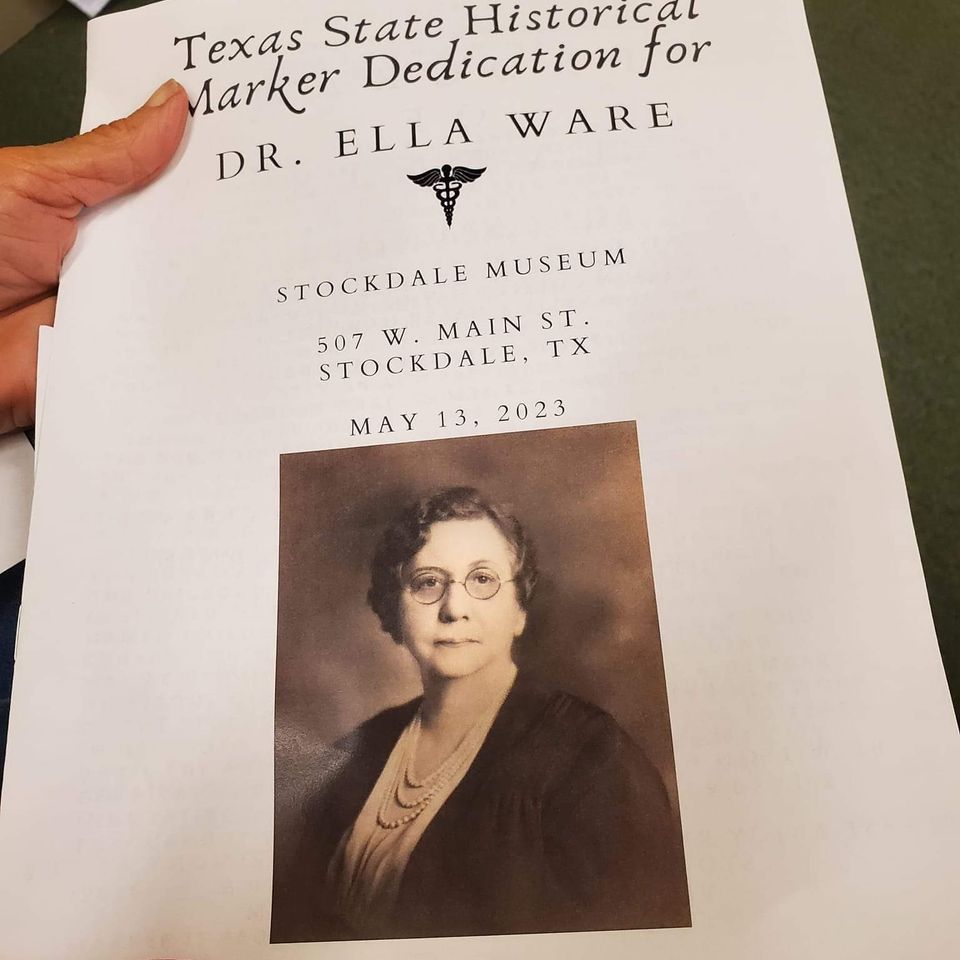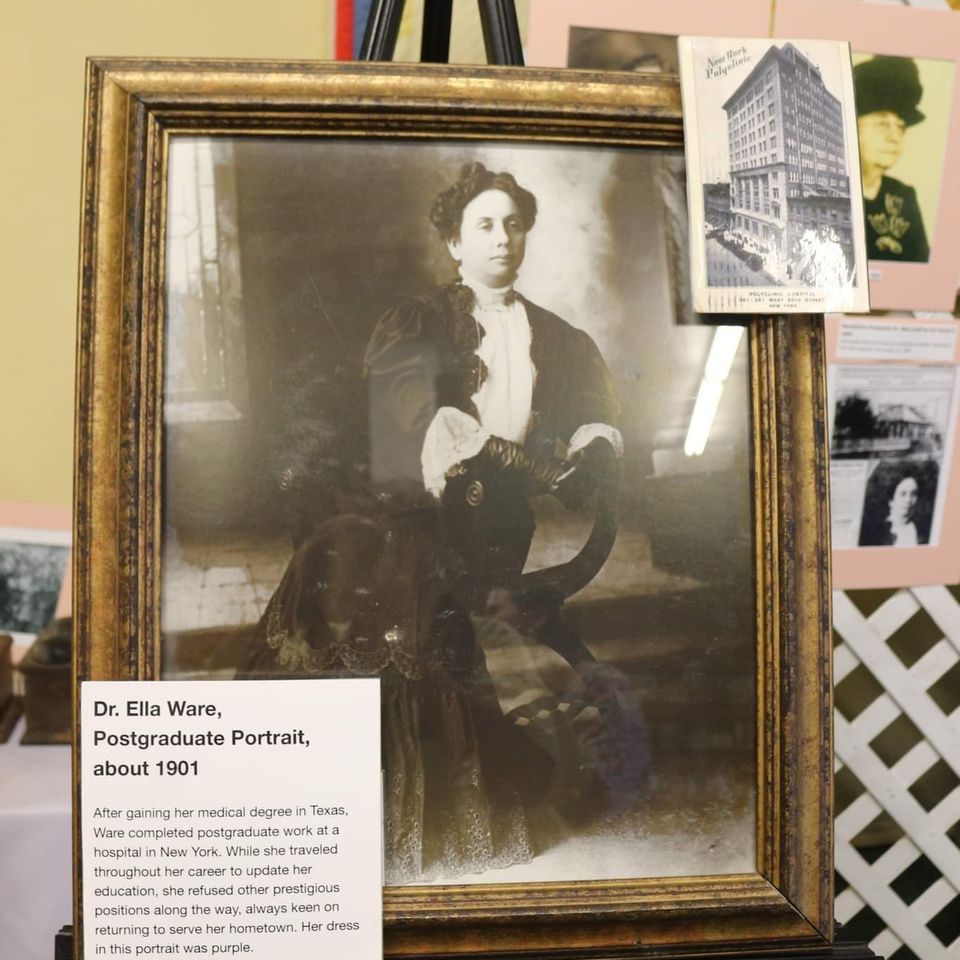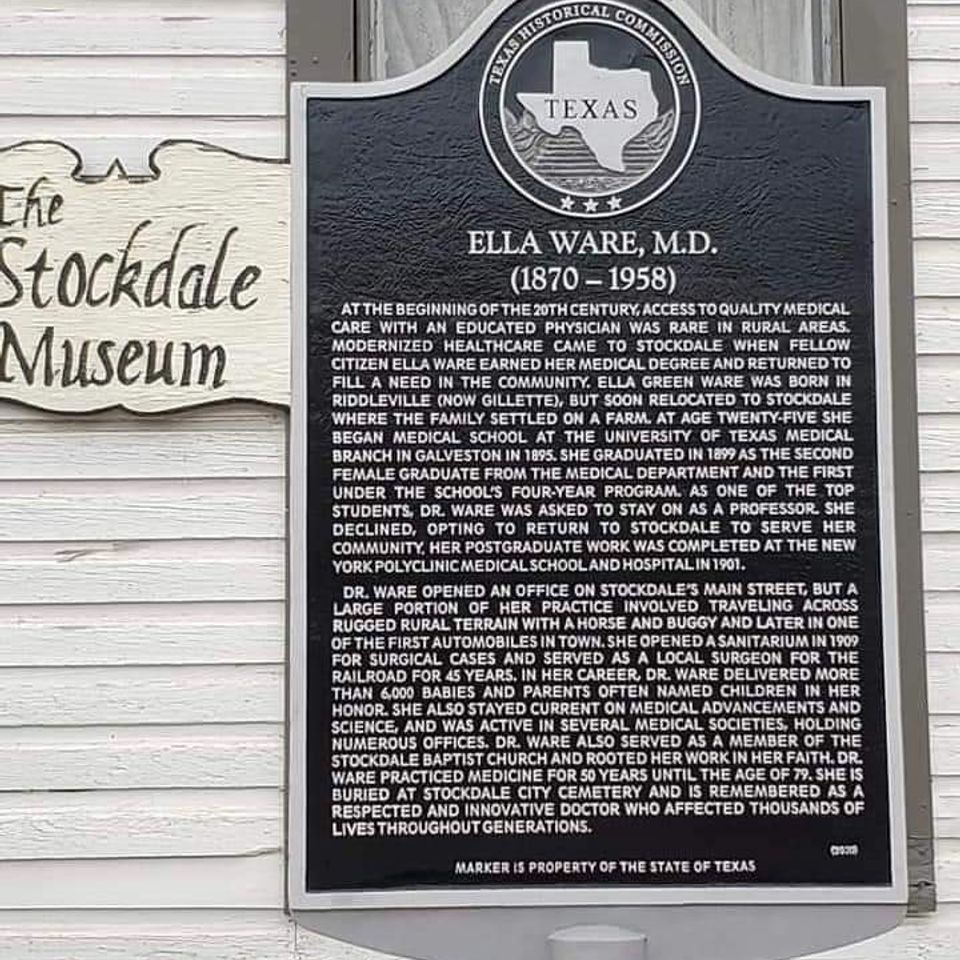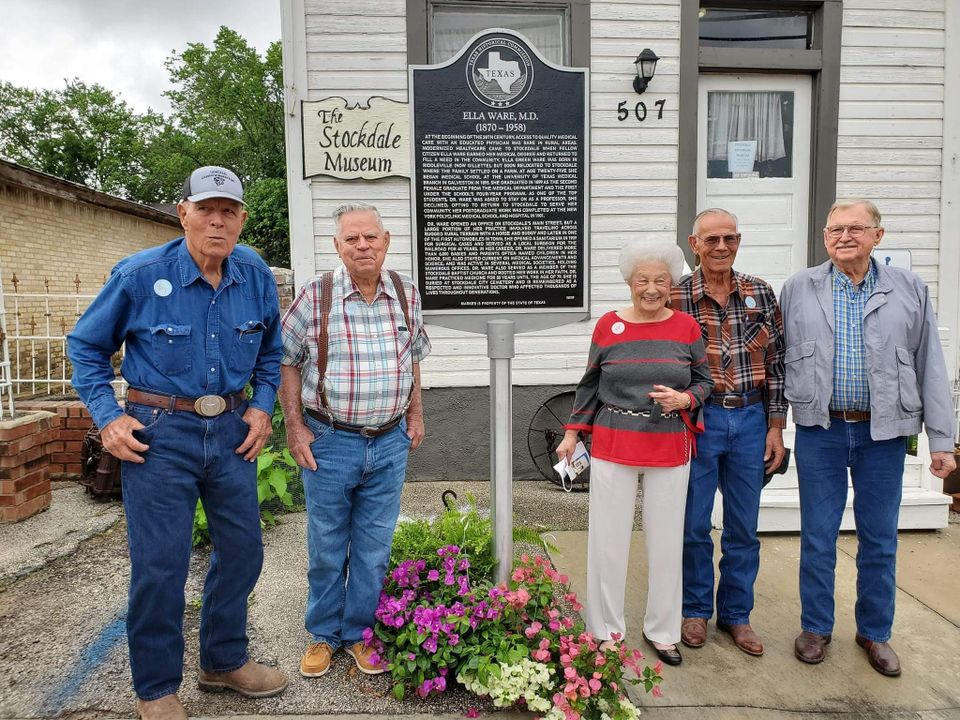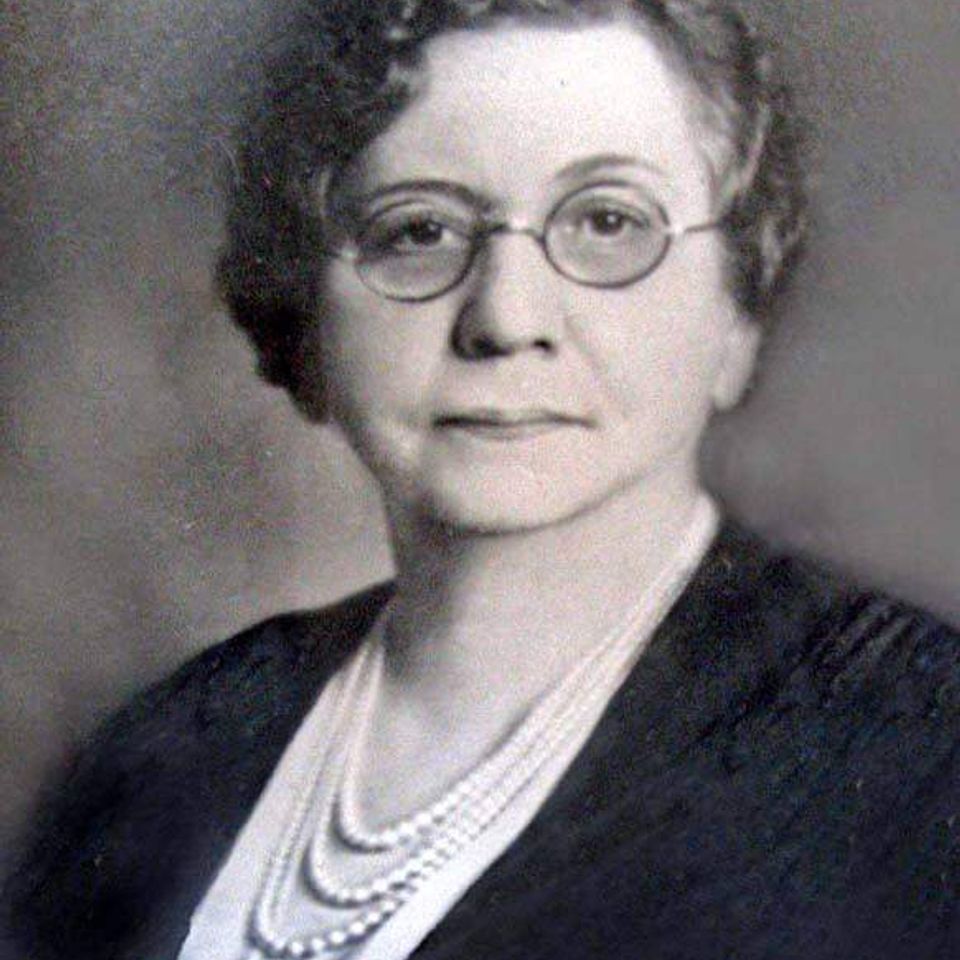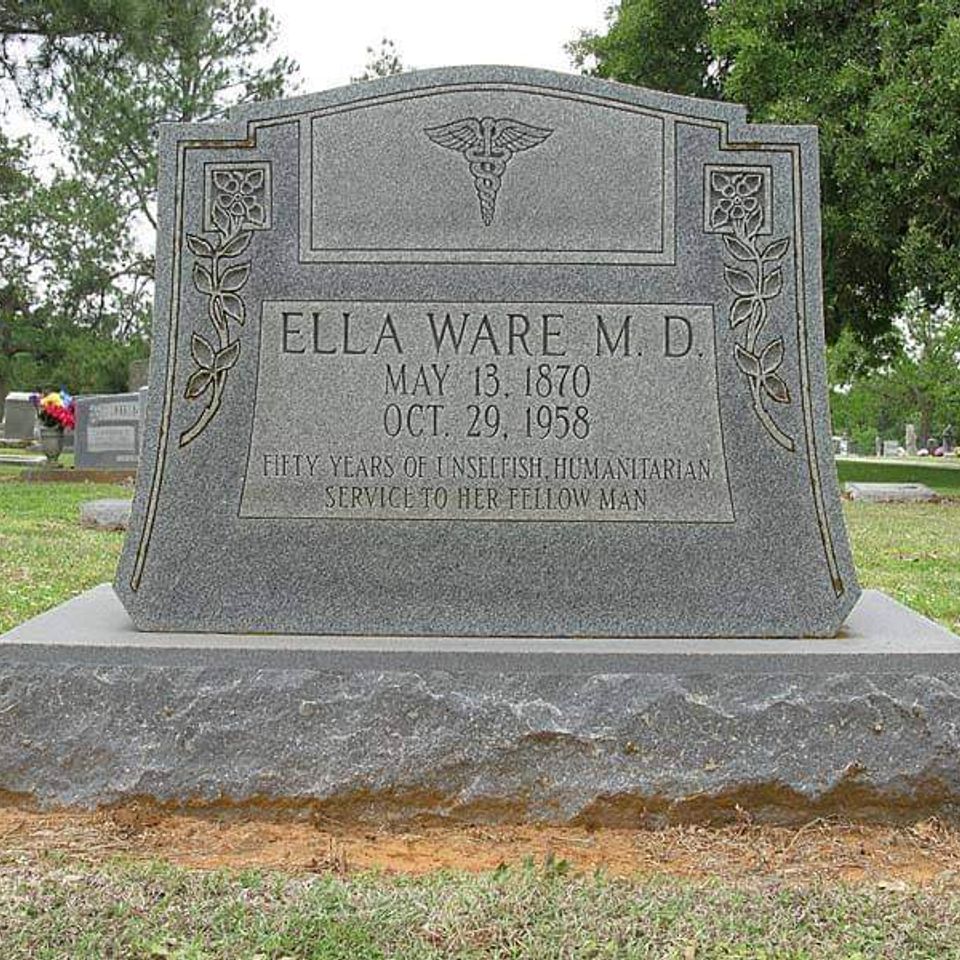Fifty years of unselfish humanitarian service to her fellow man describes Ella Green Ware. Ella Green Ware, pioneering female physician, served the community of Stockdale, Texas, for more than fifty years. She took great pride in being called "the country doc." She was the daughter of Sarah Ann (Ford) and Calvin Anderson Ware, was born at Riddleville (now Gillette), Karnes County, Texas, on May 13, 1870. Ware's family soon moved to Wilson County, Texas, and settled on a farm in the Pleasant Valley community near the town of Stockdale. There, Ware grew up with eight surviving of ten younger siblings.
As the eldest and female in a large family, she held many caretaking responsibilities. These duties intensified with the increasingly poor health of her mother, who passed away in 1890. Ware's father remarried and built a second house closer to town for his children by his first wife to stay while they attended school. Ware, by then twenty years old, ran this household and essentially became a maternal figure to her siblings. She also taught at the local school. Her father and stepmother welcomed six more children.
Some years later, Ware's father approached her while she worked in the garden. Having decided his daughter should have a chance at a better future he asked—what would she like to do? She answered that she wanted to become a nurse, one of the few careers open to women at the time. Her father countered, "How would you like to be a doctor?"
Twenty-five-year-old Ware began medical school at the University of Texas Medical Branch in Galveston in October 1895; she faced seemingly no opposition. In only its third year of operation, the school welcomed Marie DeLalondre Dietzel, who became the first woman to receive her medical degree in Texas from a state-supported institution. During Ware's time at the school, she served as an assistant physician at the affiliated John Sealy Hospital during a summer break.
Ware became the second woman to graduate from the medical department and the first under the school's expanded four-year program. She graduated on her twenty-ninth birthday, May 13, 1899. Her classmates surprised her with the gift of a medical bag full of all of the instruments she would need in her practice.
Ranking third in her class of more than forty men, Ware was asked by university officials to stay on with the promise of a prestigious full professorship. While society considered teaching a more acceptable career choice than medicine for a woman at the time, she declined the offer in favor of returning to serve her community. She completed postgraduate work at New York Polyclinic in 1901 and throughout her career updated her education in New York, Chicago, San Francisco, and Galveston. She refused other positions along the way and was always keen on returning to her hometown.
Ware's medical career differs from many other Texas women doctors of her time in that she worked in a rural area for its entirety. She took extraordinary pride in this rare position and liked to be called "the country doc." While she opened an office on Stockdale's Main Street, a large portion of her practice involved traveling across rugged rural terrain in a horse and buggy (and later an automobile) to make house calls. She made herself available twenty-four hours, seven days a week, and generally dealt with a lack of paved roads, electricity, water, and sewer systems. She eventually opened her own sanitarium to be better equipped for surgical cases but largely relied upon nutrition as a milder cure for ailments and often compounded medications herself.
Though Ware acted as a general physician, maternal care accounted for a very large portion of her practice. She delivered more than 6,000 babies in her career, and parents frequently named their children after her. She also served as local surgeon for the railroad and held that position for forty-five years.
Practicing in a rural area, which usually had a rather large percentage of low-income residents, was not always lucrative. Ware was often paid with goods such as wood, hay, pigs, turkeys, chickens, eggs, a load of watermelons, other garden produce, and sometimes even land. She generally charged as much as she felt a family could pay; in some cases this meant no charge. Often, just a warm meal was considered payment for a birth.
Ware served as a member of the Stockdale Baptist Church and rooted her work in her faith. Due to her busy schedule, she often gave large donations to supplement her lack of physical involvement in church activities. During World War I she signed a petition to promote rationing efforts and raised money for medical aid efforts in Serbia, Armenia, and Syria. She also held numerous offices in her local Karnes-Wilson Medical Society, including president, and was a member of the American Medical Association and Texas Medical Association.
Ware practiced for fifty years until the age of seventy-nine. In 1949 her patients planned to honor her birthday, the fiftieth anniversary of her graduation, and half century of care with a town celebration, when she fell and broke her leg just below her hip. After this, she met with patients at her bedside for two more years until her eyesight became too weak. In 1952 she received a certificate from the University of Texas Medical Branch at Galveston "for her long service to humanity." Later in 1954 Stockdale residents finally held their "Dr. Ware Day," at which hundreds of "Dr. Ware babies" and other patients, former medical school classmates, medical associates, friends, and family turned out to honor "the country doc."
Ware moved to San Antonio in her retirement to live with her sister, a nurse, and passed away there on October 29, 1958. Prominent Texas physician Pat Ireland Nixon provided the eulogy at her funeral. She is buried at the Stockdale City Cemetery. A quote in an editorial after her death portrayed Ware's feelings well: "She died not a wealthy woman, but she was richer than any millionaire."
BIBLIOGRAPHY:
Kassie M. Dixon, "No night was ever too dark or road too long for her": Ella Ware, M.D., The Country Doc, A State-educated Woman Practicing Medicine in Early 20th-century Rural Texas (M.A. thesis, Sam Houston State University, 2016). Birdie Lorenz, Stockdale: A Glimpse into the Past (n.p.: n.p.). San Antonio Express, October 17, 1954; October 31, 1958. Stockdale Star, May 12, 1949. Texas State Journal of Medicine, December 1958.
(Courtesy of Texas State Historical Association)
